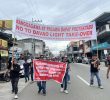Burdens in the year gone by
The Arroyo administration�s major economic effort in 2006 has been to rein in mounting government fiscal deficits. The national government deficit of P50.4 billion ($1,024,494,359 at an exchange rate of $1=P49.195) in the first nine months of 2006 is projected to come to a full-year deficit of around P100 billion ($2,032,726,903). However the achievements on this front are less signs of a strengthening economy than indications of how economic burdens are placed on those already least able to bear them � the deficit was reduced by charging higher taxes while drastically reducing critical spending especially on social services.
Conspicuously implemented amid a climate of harsh political repression were higher taxes and reduced public spending on education, health, housing and economic services � bringing to mind images of a strong state forcing unpopular measures on the people. On one hand, some P278 billion ($5,650,980,790) are targeted to be raised in 2006 from higher taxes, fees, rates and charges for public services. The new 12 percent Value-Added Tax (VAT) since February alone has taken an additional P61.7 billion ($1,254,192,499) from consumers� pockets in the first ten months of 2006.
On the other hand, the government opted to cut back further on already emaciated social service budgets. Real public spending on education continued to fall in 2006. The current P1, 296 ($26.34) per Filipino (in 2001 pesos) spending for education is 13 percent down from its 2001 level. Health spending has fallen by an even more drastic 27 percent over the same period amounting to a meager P120 ($2.43) per Filipino.
These fiscally repressive measures are aimed at assuring creditors that loans would be paid and foreign investors that foreign exchange would be available for their globally-integrated commercial, financial and pseudo-manufacturing operations. Around P721.7 billion ($14,570,190,059) is programmed to be repaid to creditors in 2006 which is equivalent to P6, 391 ($129.91) per Filipino (in 2001 pesos), or nearly five times the combined spending on education and health. As it is, the government borrowed P592.4 billion ($12,041,874,174) in the first 11 months or slightly less than in the same period in 2005. Over four-fifths of this borrowing went straight back to creditors for debt servicing.
The International Monetary Fund (IMF) and World Bank (WB) have visibly supported the Arroyo administration�s fiscal squeeze. Aside from the IMF-WB issuing favorable country assessments of government finances, the WB in December approved the immediate single tranche disbursement of a US$250 million policy loan � its first in almost a decade � because the associated fiscal policy conditionalities were already met.
2006: Davao Today's Year-End Series








